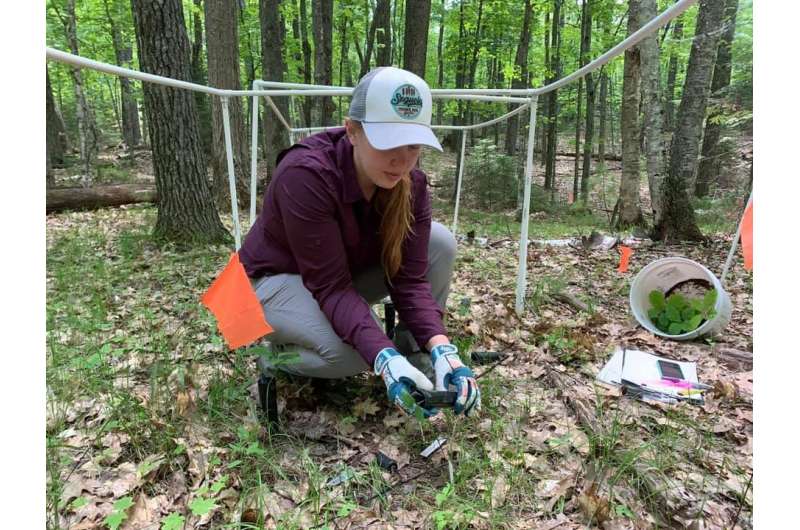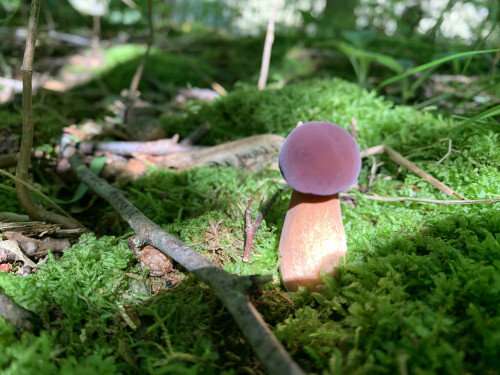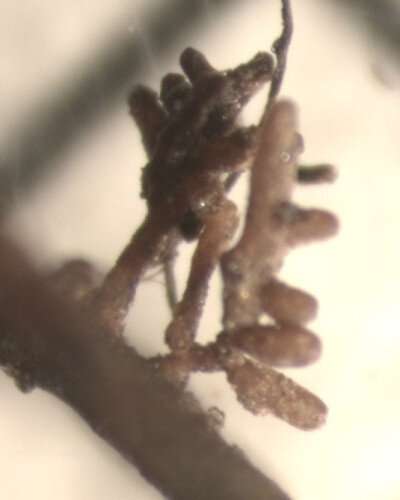This article has been reviewed according to Science X's editorial process and policies. Editors have highlighted the following attributes while ensuring the content's credibility:
fact-checked
peer-reviewed publication
trusted source
proofread
Climate-stressed trees get a boost from new microbial partnerships

Climate change is subjecting plants to rapid shifts in temperature and precipitation, pushing them into new ranges and stressing them in old ones.
Trees may have an easier time adapting in both cases by making new microbial friends underground, according to new research from the University of Wisconsin–Madison published today in the journal Science.
Plants live across wide ranges of heat and cold and rain and drought, but they don't fill their niches alone. Along with the animals and insects that live on and around a tree—pitching in now and then to aid pollination or pest control or seed dispersal—there are innumerable microbes in the soil (like various fungi that grow alongside tree roots). These microbes can blunt the normal stresses of life by helping trees draw in more nutrients and water or influencing the time they leaf out or flower to best match seasonal conditions.
That relationship could play an important role in climate adaptation.
"Climate change is adding new stress faster than most trees are used to," says Richard Lankau, UW–Madison professor of plant pathology. "We have some sense of how most tree species are going to have to react—where they will be pushed out and where they can move. But that's based on what we think the trees themselves can handle. Forests may actually be more resilient if we give them credit for shifting microbial communities."

To test the way communities of microbes from different locales affected stressed trees, Lankau, along with research scientist Cassandra Allsup and research specialist Isabelle George, planted trees at the distant edges of their current ranges. Seedlings from a long list of deciduous species—oak, elm, hickory, maple and more—went into the ground about 450 miles apart in plots in northern Wisconsin and central Illinois.
Before the trees were moved to the distant plots, they were sprouted from seeds in UW–Madison greenhouses in different soil samples collected from 12 sites in Illinois and Wisconsin, establishing distinct microbial relationships. Some of the trees were grown in familiar soil collected near the central part of the trees' ranges. Some were introduced to new microbial communities by sprouting in soil collected from sites physically closer to (or more alike in typical temperature and rainfall conditions) to the experimental plots in which they would live for three years.
Up north at UW–Madison's Kemp Natural Resources Station, where broadleaf forests naturally give way to woods dominated by evergreen trees, the effects of tree-microbe relationships were stark.
"The trees all survived summer just fine, unless they were eaten by a deer," says Lankau. "It's the cold winter where we saw a separation in success. The seedlings exposed to microbes from northern sites were much more likely to survive the winter than those pre-inoculated with microbes from southern Wisconsin, the normal heart of where they live."
Trees grown with microbes sampled from the coldest sites were at least 50% more likely to survive through three cold winters in what might be the new, leading edge of the climate-shifted range, according to the researchers' results.

At the southern site, where trees would likely be subjected to higher temperatures than they prefer, results were similarly positive for trees matched with microbes acquainted with the climate—though the boost in resilience was limited to tree species that tend to pair with certain types of microbes, called arbuscular mycorrhizal fungi, that pierce plant cell walls. Trees subjected to artificial drought and paired with microbes imported from the driest conditions got the biggest survival boost, possibly a result of arbuscular fungi's talent for collecting moisture.
On top of a better understanding of the way trees and microbes work together in a race against climate change, plant-fungi matchmaking may be a boon to plans to reforest the planet.
"The number of trees pledged to be planted worldwide in climate change mitigation strategies is just astronomical," says Lankau. "Planting trees is the one climate change mitigation strategy that everyone agrees with, so everyone has a plan to plant billions and trillions of new trees."
While it's no help to mature growth or the next generation of naturally seeded trees, Lankau's lab is recruiting tree nurseries across the Midwest as partners in more microbe-inoculation projects to give new seedlings a leg up.
"We're wondering if we can capitalize on this study, whether it can be used strategically in different areas of the country," Lankau says. "If we're going to come anywhere close to the tree-planting and forest-acreage-restoration targets governments have set, ideas like this could have a significant impact on the success of those projects."
More information: Cassandra M. Allsup et al, Shifting microbial communities can enhance tree tolerance to changing climates, Science (2023). DOI: 10.1126/science.adf2027
Michelle E. Afkhami, Past microbial stress benefits tree resilience, Science (2023). DOI: 10.1126/science.adi1594 , www.science.org/doi/10.1126/science.adi1594
Journal information: Science
Provided by University of Wisconsin-Madison




















